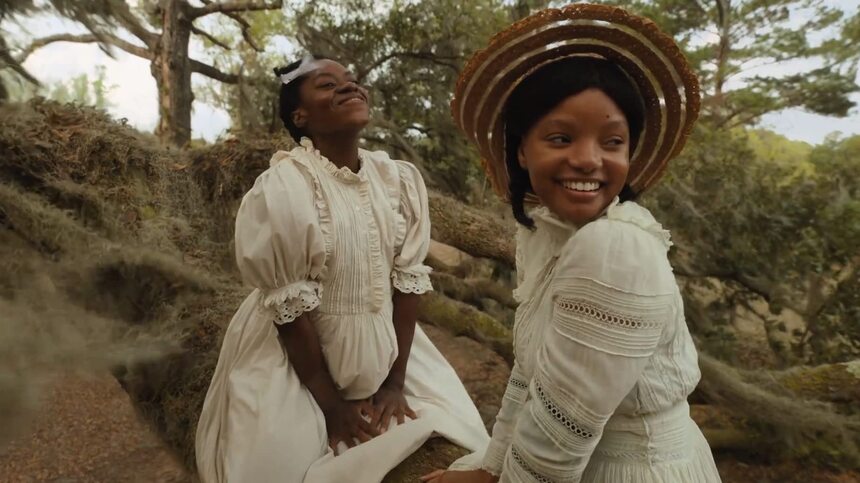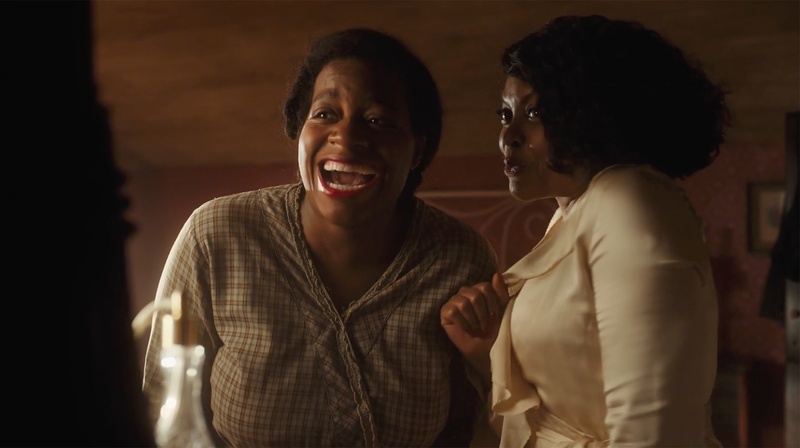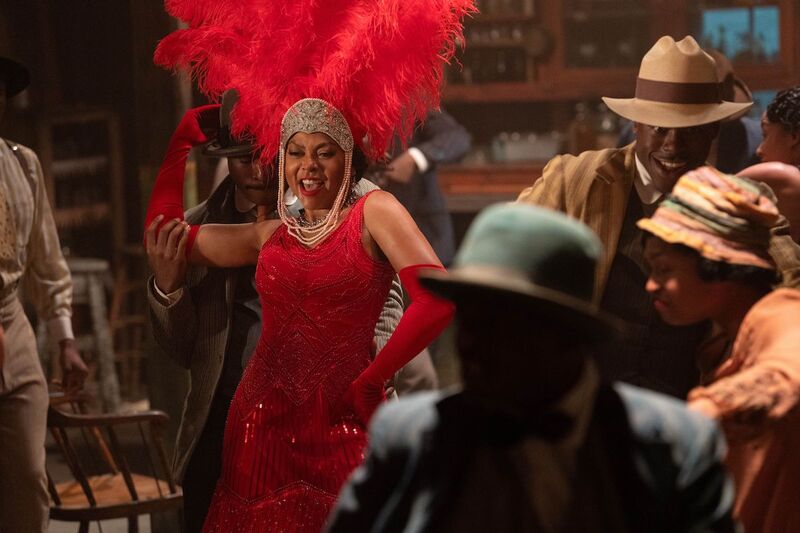THE COLOR PURPLE Review: The Joy Is Infectious, If a Little Forced
Fantasia Barrino, Taraji B. Henson, and Colman Domingo star in the adaptation of the Broadway musical.

Any adaptation of an artistic work, from one form to another, becomes, arguably, more of an interpretation by those doing the translation: their view of what they think the work is about, or what they want an audience to take from their interpretation.
The Color Purple began as an epistolary novel by Black American writer Alice Walker, published in 1982 (which won the Pulitzer Prize). It then was adapted as a film in 1985, directed by Steven Spielberg. It then became a Broadway musical, first in 2005 and then revived in 2015. Both the original and these first two adaptations were critical and commercial successes. It stands to reason that the musical would be adapted for film, and pulling out all the stops, with the power of producers Spielberg, Oprah Winfrey, and Quincy Jones behind it.
While musicals don't purposefully or always avoid darker content, this story that includes abuse, rape, incest, and extreme racial discrimination, doesn't feel like it would quite lend itself to the musical form. Which, even if it explores difficult subjects, does tend towards joy and life (there are exceptions, of course, like Sweeney Todd). But at its heart, The Color Purple is about joy, specifically Black joy, female joy and empowerment, finding courage and strength in the face of seemingly insurmountable obstacles - and all these themes lend themselves quite well to the musical form.
The success of the film lies mostly in the success of the music and the performers; it might, though, have benefitted from a more experienced directorial hand. Director Blitz Bazawule had only made two films before this, but has a long career in music; despite this, there are often problems with presentation, where an eye for how the form would have best represented the material. But the songs and their singers make for what should be, and is, an overall enjoyable experience.
This is the story of Celie (Phylicia Pearl Mpasi), a young girl living with her father and sister Nettie (Halle Bailey) in early 20th century Georgia. While they have a reasonable working class life running a general store, they still live under the yoke of racism and the not-so-distant time of slavery.
Celie has been raped by her father for long enough that it's resulted in two children, who have been taken away from her. She is forced to marry Mister (Colman Domingo), a man who wants nothing more than a cook, maid, caregiver to his children, and prostitute for his bed. When Mister tries to rape Nettie, she is able to fight him off, but is driven off their land. Celie is left alone in the world without any comfort or support.
That is, until the now-adult Celie (Fantasia Barrino) meets Mister's sometime mistress Shug Avery (Taraji P. Henson), a blues singer who lives the kind of wild and extravagent lifestyle that is the opposite of everything Celie knows. Where Celie is constantly told she is ugly and poor, fit only for service to men and not so good at that, Shug is constantly praised. As the friendship between these women blossoms, so Celie begins to understand what value she has, across a backdrop of an evolving South and the lives of her family and neighbours.
The music is high calibre (not surprising, given its Broadway success), each song having its moment in the narrative without feeling obstrusive or unnecessary, a credit to Marsha Norman who wrote the book for the stage adaptation. This is, naturally, a different tone and style than the original book or narrative film; it has to be, and the music does tend towards being energetic and big, even in what might be considered quieter, introspective moments.
Bazawule puts the joy and love of the women in this film first and foremost. The joy and bond between Celie and Nettie is infectious, even in their moments of sorrow, as when Celie recognizes one of her babies in the arms of the adopted mother; when Sophia (Danielle Brooks), Celie's daughter-in-law, lets it be known that she won't let any man beat on her, it's an anthem against violence that still finds heart in its moment. The easy transition from dialogue to song and back, the connection between the performers, make for a ride that feel smooth and unhindered, even in difficult moments of violence and pain.
It is full to the brim with colour and life. And there is no question on how much the performers are giving; certainly the quality of their performances is not surprising. Both Domingo and Henson have proven the variety and calibre of their acting chops, and here we can witness Henson's singing ability as well.
While still feeling like stage musical numbers in essence, Bazawule still makes use of the various spaces to encircle his performers and give a feeling of how song and dance are a natural extension of expression. It's not hard to become attached to Barrino as Celie, and want to see her protected and saved, and ultimately thrive.
But it does feel as if this push for joy comes at something of a cost to the text. What's lost is the dirtiness, the grime, the lust (sometimes there, but still clean in its way), the sheer terror that would have been felt by Celie and others on a daily basis; the depth of pain and constant dread of life that she comes out of. The film seems too willing to forgive those who have committed great wrongs, as we're never really given the chance to understand just how terrible they have been.
It often feels too glossy and too glossed-over. And while most Hollywood films have gone to a darker palatte (in that it's frequently hard to see what's on the screen), The Color Purple is frequently far too bright. In the story's very important and relevant queer moment -- Shug and Celie's kiss, in a movie theatre balcony, projector behind them -- the light shines so brightly that you can't even see the kiss, almost as if the film was making an effort for the audience to be able to forget the moment.
If it wraps itself in Black joy, perhaps we shouldn't fault it. While it has lost some of the queerness and darkness that makes the original book and film layered and rich, the musical opts for colour, optimism and forgiving resolution. The Color Purple shines perhaps a little too bright for its own good at times, but it's hard not to find enjoyment from the performers and the music.
The Color Purple
Director(s)
- Blitz Bazawule
Writer(s)
- Marcus Gardley
- Alice Walker
- Marsha Norman
Cast
- Fantasia Barrino
- Taraji P. Henson
- Danielle Brooks









